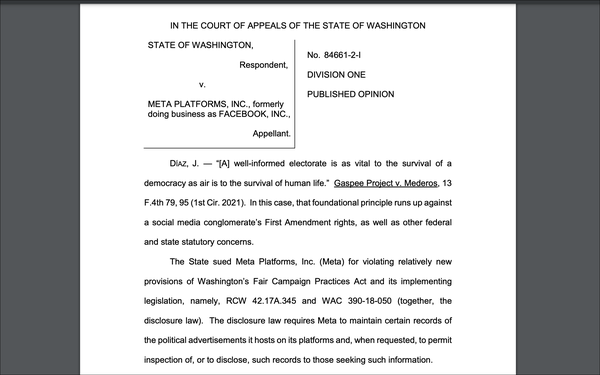
A Washington appellate court has upheld
Meta's $25 million fine for violating a state law requiring online companies to disclose detailed information about political ads.
The ruling, issued Monday by the Washington Court of Appeals, comes in a legal
battle dating to 2020, when Washington state Attorney General Bob Ferguson sued Meta for allegedly violating a state law that requires companies displaying digital ads to make available a host of
information -- including the ads' cost and sponsors, descriptions of the geolocations and audiences targeted, and the total number of impressions generated.
Ferguson alleged in a complaint
against the company that it sold hundreds of ads to at least 171 Washington state political committees, but failed to make information about the ads available.
advertisement
advertisement
King County Superior Court Judge
Douglass North sided against Meta, ruling in 2022 that the
company violated the state law 822 times, based on evidence that Facebook failed to respond to specific requests for information about political ads. He fined the company $30,000 per violation, for a
total of nearly $25 million.
Meta then appealed, contending that it attempted to ban all political advertising in the state, but that “some users chose to ignore the ban and ran those
ads anyway.”
The company also said the ruling should be reversed on the grounds that the state law violates the First Amendment.
“Unlike every other disclosure law that the
Supreme Court has endorsed, this law imposes those burdens not on political speakers or candidates, but on digital platforms that display and disseminate political speech,” the company wrote in
its appellate papers.
The company added that in 2019 a federal appellate court struck down a Maryland law that would have required online news
sites, social media services and other platforms with more than 100,000 unique monthly users to post information about political ad purchases on their own websites.
The appellate court
rejected Meta's argument, essentially holding that the law didn't violate the First Amendment because the measure furthered the “important government interest of informing the electorate in a
timely manner about who advertisers are reaching and how advertisers are attempting to influence an election.”
The judges added that Washington officials provided evidence that the law's
goal “is perfectly aligned with the data required.”
“The disclosure law is tailored to pull into the light of day the most essential and unique aspects of modern social media
political advertising: micro-targeting,” Judge Michael Diaz wrote in an opinion joined by Judges David Mann and Cecily Hazelrigg.
Meta also said the law was overridden by Section 230 of
the Communications Decency Act, which immunizes companies from liability for material posted by users. Among other arguments on this point, Meta said the Washington law was inconsistent with Section
230 because the state law required the company to monitor ads posted by users, in order to determine whether information about the ads had to be disclosed.
The judges rejected that argument as
well.
“At most, the disclosure law merely tasks Meta with placing ads into 'political' and 'non-political' categories to facilitate future inspection or disclosure,” Diaz
wrote.